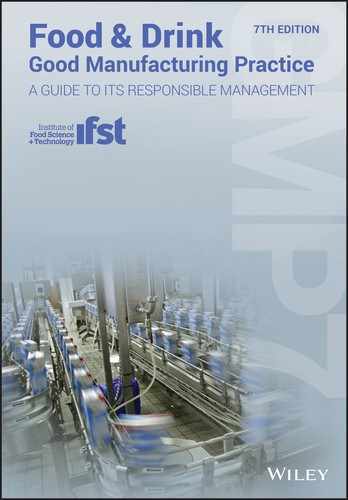33
CONTRACT MANUFACTURE AND OUTSOURCED PROCESSING AND PACKAGING
Principle
Where complete or part manufacture is carried out as an own‐label, private‐label, distributor’s‐own‐brand, contract packing or similar operation, the obligation is on the contract acceptor (the actual manufacturer) to ensure that outsourced processing and production is carried out in accordance with good manufacturing practice (GMP) in the same way that would be expected where she/he manufactures for distribution and sale on his/her own account, except where responsibility is specifically excluded by mutual agreement between the contract giver and the contract acceptor.
Contract Acceptance
33.1 The contract acceptor should ensure that the terms of the contract are clearly stated in writing and that raw materials, in‐process materials and end products are covered by adequate, comprehensive specifications (as outlined in other chapters). Any special GMP requirements should be clearly emphasised, and quality control, record transfer, coding, rejection, dispute and complaint procedures should be identified and agreed. Items of possible confidentiality should be identified and any appropriate safeguards be mutually agreed.
33.2 If the contract giver has a designated approved suppliers list, this must be discussed and agreed with the contract acceptor. The responsibility for approval of packaging and artwork design with the packaging supplier must also be agreed. Consideration must be given to the security of packaging and artwork design to prevent inappropriate use and the risk of counterfeiting or other forms of food crime (see Chapters 5 to 7).
33.3 It is normal practice for contract givers to impose contractual conditions that ensure compliance with food safety, legal and quality standards and principles of GMP. This is desirably achieved, at least in the first instance, by a visit to the manufacturing unit by the contract giver’s quality control manager and/or brand owner/retailer product technologist as appropriate to the status of the contract giver. The visit should include the following objectives:
- to ensure that within the manufacturing environment the food can be produced safely and legally, and to the required quality standards;
- to agree a detailed product specification covering all aspects of the product, processing and packing requirements as well as controls for delivery, embracing parameters to be used for acceptance or rejection, and any legal requirements relating thereto;
- to agree levels of sampling of raw materials, in‐process materials and finished products by the processor and sampling plans to be used in case of dispute;
- to evaluate the adequacy of the control resources, systems and methods, including traceability and records of the manufacturer; and
- to agree, wherever possible, objective methods of examination, while subjective measurements should conform to recognised and accepted standards if possible.
Agreement in all five areas is essential for any manufacturer/customer trading relationship and should benefit both parties.
33.4 In the event that the contract giver is outsourcing part of the manufacturing of a branded product, then the brand owner should be notified and approval sought where required. The contract giver should also establish validation, monitoring and verification activities both prior to and for the duration of the contract with the contract acceptor. The extent of these activities will be based on a formal, documented risk assessment and may include, but is not limited to, organoleptic, chemical and microbiological assessment. The contract acceptor will be approved and monitored in line with the contract giver’s supplier approval and performance monitoring procedure (see Chapter 23).
Third‐party Certification
33.5 Historically, contract givers undertook the verification of manufacturing units against their individual company‐specific standards, protocols and codes of practice. Indeed this is still the practice for some contract givers who have developed their own bespoke manufacturing standards. However, increasingly verification is undertaken by third‐party certification bodies, especially as the supply chain becomes more global. The development of private standards such as British Retail Consortium (BRC) Global Standard for Food Safety, BS EN ISO 22000 2005, and latterly the work of the Global Food Safety Initiative (GFSI), has seen a rise in third‐party certification. This certification is often a prerequisite to supply. It should be noted that acceptance of third‐party certification, or the use of third‐party auditors, as the sole evidence of suitability to pack or manufacture food products renders the contract giver potentially unable to provide an adequate due diligence defence. There is a requirement for the contract giver to verify that third‐party certification and/or third‐party inspections and audits are undertaken to the required standard and that the decisions made by such auditors are appropriate and reflect actual practice. In this context, contract givers must determine the level of verification risk (VR) of accepting third‐party certification and auditing/inspection. As VR increases, so ultimately does the risk of customer complaint, product withdrawal and recall and incidence of food‐borne illness and food poisoning.
33.6 The evaluation for these aforementioned private standards must be undertaken by certification bodies who are accredited against the standard ISO/IEC 17021‐1: 2015 – Conformity assessment – Requirements for bodies providing audit and certification of management systems.
